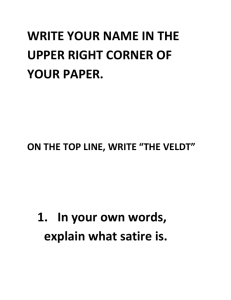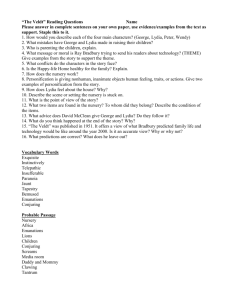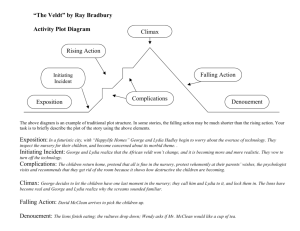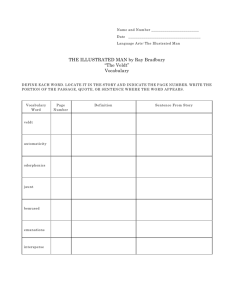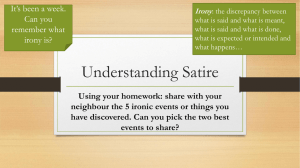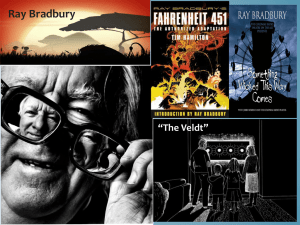“THE VELDT” THEMES
advertisement
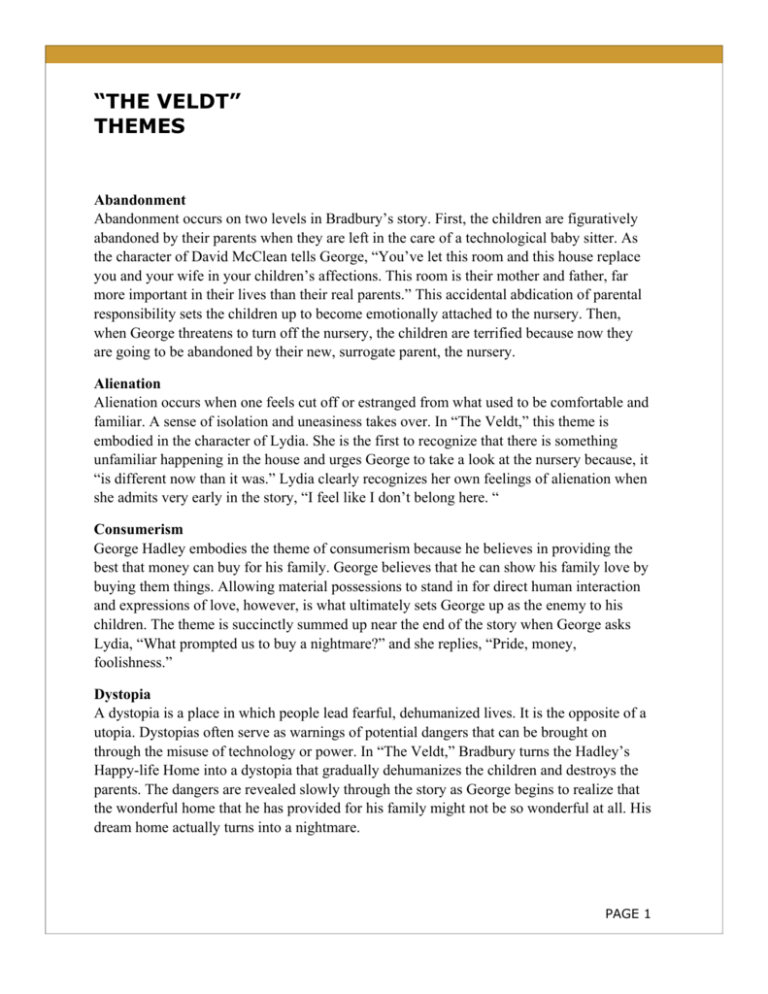
“THE VELDT” THEMES Abandonment Abandonment occurs on two levels in Bradbury’s story. First, the children are figuratively abandoned by their parents when they are left in the care of a technological baby sitter. As the character of David McClean tells George, “You’ve let this room and this house replace you and your wife in your children’s affections. This room is their mother and father, far more important in their lives than their real parents.” This accidental abdication of parental responsibility sets the children up to become emotionally attached to the nursery. Then, when George threatens to turn off the nursery, the children are terrified because now they are going to be abandoned by their new, surrogate parent, the nursery. Alienation Alienation occurs when one feels cut off or estranged from what used to be comfortable and familiar. A sense of isolation and uneasiness takes over. In “The Veldt,” this theme is embodied in the character of Lydia. She is the first to recognize that there is something unfamiliar happening in the house and urges George to take a look at the nursery because, it “is different now than it was.” Lydia clearly recognizes her own feelings of alienation when she admits very early in the story, “I feel like I don’t belong here. “ Consumerism George Hadley embodies the theme of consumerism because he believes in providing the best that money can buy for his family. George believes that he can show his family love by buying them things. Allowing material possessions to stand in for direct human interaction and expressions of love, however, is what ultimately sets George up as the enemy to his children. The theme is succinctly summed up near the end of the story when George asks Lydia, “What prompted us to buy a nightmare?” and she replies, “Pride, money, foolishness.” Dystopia A dystopia is a place in which people lead fearful, dehumanized lives. It is the opposite of a utopia. Dystopias often serve as warnings of potential dangers that can be brought on through the misuse of technology or power. In “The Veldt,” Bradbury turns the Hadley’s Happy-life Home into a dystopia that gradually dehumanizes the children and destroys the parents. The dangers are revealed slowly through the story as George begins to realize that the wonderful home that he has provided for his family might not be so wonderful at all. His dream home actually turns into a nightmare. PAGE 1 “THE VELDT”: THEMES Illusion versus Reality The ability to distinguish illusion from reality and the co-mingling of the two is a key theme in “The Veldt.” George ultimately agrees to turn on the nursery one more time, thus putting himself and his wife in jeopardy, because he believes that there is a definite distinction between illusion and reality. Something that is an illusion can never become truly “real.” This is why George believes that the lions pose no real threat. They are only part of a machine that creates wonderful illusions, “Walls, Lydia, remember; crystal walls, that’s all they are. Oh, they look real, I must admit—Africa in your parlor—but it’s all dimensional superactionary, supersensitive color film and mental tape film behind glass screens.” What George fails to understand is, in the world of this short story, illusion and reality are transposable. One can become the other at any moment. Man versus Machine One of the major conflicts in Bradbury’s story is that of man versus machine. The story is built around the struggle to control and direct the destructive power of the nursery’s technology. Whoever controls the machine will have the ultimate power. In this story man is destroyed by the machines in two ways: not only are George and Lydia murdered by the nursery’s technology, but the children’s humanity is also destroyed. By identifying so closely with the nursery, the children have become less than human. They feel no guilt, remorse or regret when their parents die, and it is clear that they have become as cold and emotionless as the machinery that controls the nursery. Revenge “The Veldt” can be read as the ultimate children’s revenge story. Children often feel powerless against adults and create elaborate fantasies in which they have the power to conquer any adult who refuses to give them what they want. George triggers these fantasies in Peter and Wendy when he forbids them to take the rocket to New York. The children are used to getting their own way, and they become very angry when they cannot have what they want. Thus the cycle of revenge is set in motion. Telepathy Telepathy plays an important role in “The Veldt” as it provides the medium through which the weapons are deployed. The room manifests thought patterns on its walls, thus creating the possibility for evil thoughts to conjure up evil things. The children are able to use their telepathy to direct their destructive powers into the nursery images, thus creating a deadly setting for their parents. In the scientifically advanced world of this short story, thoughts have now become weapons, and children can kill their parents just by wishing them dead. http://www.enotes.com/veldt/45570 PAGE 2
